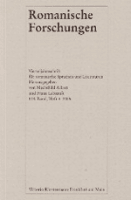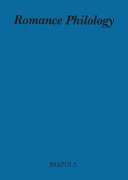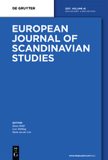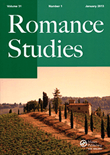
ROMANISCHE FORSCHUNGEN
Scope & Guideline
Advancing Knowledge in Romance Language Studies
Introduction
Aims and Scopes
- Linguistic Analysis and Variation:
The journal frequently publishes studies on the linguistic features of Romance languages, including phonetics, morphology, syntax, and sociolinguistics. Research often employs a variationist approach to explore dialectal differences and the impact of language contact. - Literary Studies and Criticism:
A significant focus of the journal is on literary analysis, covering a wide array of genres from the Renaissance to contemporary literature. This includes thematic studies, critical editions, and explorations of authorial influence across cultures. - Cultural and Historical Contextualization:
Papers often situate literary and linguistic phenomena within broader socio-historical contexts, examining the interplay between literature, culture, and society, particularly in the context of colonialism, migration, and identity. - Interdisciplinary Approaches:
The journal embraces interdisciplinary methodologies, integrating perspectives from fields such as history, philosophy, and gender studies, to provide a comprehensive understanding of Romance languages and literatures. - Digital Humanities and Lexicography:
Recent publications illustrate a growing interest in digital tools and methodologies for linguistic research, including electronic dictionaries and corpus linguistics, emphasizing the modernization of Romance studies.
Trending and Emerging
- Interdisciplinary and Cross-Cultural Studies:
There is a marked increase in interdisciplinary research that bridges literature, linguistics, and cultural studies, particularly in relation to migration, identity, and postcolonialism, reflecting contemporary global issues. - Digital Humanities and Computational Linguistics:
Recent publications indicate a growing integration of digital humanities methodologies, including computational analysis of texts and the development of electronic resources, which enhance the study of Romance languages and literatures. - Sociolinguistics and Language Variation:
A surge in research exploring sociolinguistic dynamics, particularly in multilingual contexts or among minority languages, highlights the journal's commitment to understanding language in its social context. - Gender Studies and Feminist Literary Criticism:
Emerging themes in gender studies and feminist literary criticism are increasingly prominent, with a focus on female authors, gender dynamics in literature, and the representation of marginalized identities. - Environmental and Ecocritical Perspectives:
An emerging trend is the exploration of environmental themes and ecocriticism in Romance literature, indicating a response to contemporary ecological concerns and the representation of nature in literature.
Declining or Waning
- Traditional Historical Linguistics:
There is a noticeable decrease in papers focused solely on traditional historical linguistics, particularly those that do not incorporate contemporary sociolinguistic perspectives or engage with modern linguistic theory. - Fixed Genre Studies:
Research on fixed literary genres, such as classical epic or strict forms of poetry, seems to be waning. This may reflect a broader trend towards more fluid and experimental forms of literature in contemporary studies. - Narrowly Defined National Literatures:
There appears to be a shift away from studies that focus exclusively on national literatures in isolation. Instead, there is a growing interest in transnational and comparative literary studies that cross traditional boundaries. - Conventional Theoretical Frameworks:
Papers that rely heavily on conventional theoretical frameworks without integrating new methodologies or interdisciplinary approaches are becoming less frequent, indicating a push towards innovative research paradigms. - Regional Studies in Isolation:
The focus on specific regional studies without contextualizing these within broader cultural or global frameworks is declining, as the journal increasingly emphasizes interconnectedness in Romance languages and literatures.
Similar Journals

ROMANCE PHILOLOGY
Bridging Theory and Practice in Romance PhilologyROMANCE PHILOLOGY is a distinguished academic journal dedicated to the exploration of language, literature, and linguistic theory within the Romance language family. Published by BREPOLS PUBL, it offers a platform for scholars, researchers, and practitioners to disseminate their findings and engage with the latest developments in these fields. The journal's impact factor reflects its standing, positioned within the Q4 category in Linguistics and Language and Q3 in Literature and Literary Theory for 2023, making it an essential resource for those studying Romance philology. Although coverage in Scopus was discontinued in 2021, the journal maintains a commitment to rigorous academic standards and comprehensive peer-review processes. With a broad scope encompassing theoretical and practical aspects of Romance languages and literatures, ROMANCE PHILOLOGY invites contributions that push the boundaries of knowledge and enrich the academic dialogue surrounding these vital areas of study. For those passionate about linguistic and literary pursuits, this journal stands as a significant gateway into the evolving discourse of Romance studies.

Slavia-Casopis pro Slovanskou Filologii
Exploring the Depths of Slavic Linguistic HeritageSlavia-Casopis pro Slovanskou Filologii is an esteemed journal dedicated to the advancement of Slavic philology, published by the SLOVANSKY USTAV AKAD CESKE REPUBLIKY in the heart of the Czech Republic. With its ISSN: 0037-6736, the journal serves as a vital platform for scholarly exchange, embracing a rich academic tradition since its convergence years beginning in 2002. The journal has achieved notable recognition, with a Q3 ranking in Linguistics and Language and a Q2 in Literature and Literary Theory as of 2023, highlighting its contribution to these dynamic fields. Although it does not currently offer open access, its rigorous selection of articles ensures that it remains a crucial resource for researchers and practitioners alike, facilitating a deeper understanding of Slavic languages and literature. Scholars benefit from the journal's extensive research backdrop, enhanced by its current ranks in the Scopus database, underscoring its significant placement within the academic literature landscape. The editorial scope of Slavia promotes innovative inquiries that reflect cultural, historical, and theoretical perspectives endemic to Slavic studies, making it indispensable for professionals, students, and enthusiasts invested in the exploration of Slavic linguistic and literary heritage.

Studia z Filologii Polskiej i Slowianskiej
Unraveling the Rich Tapestry of Slavic PhilologyStudia z Filologii Polskiej i Slowianskiej is a prominent journal published by the Polish Academy of Sciences, Institute of Slavic Studies, focusing on the rich and diverse field of linguistics and language studies, particularly within the Slavic context. With the ISSN 0081-7090 and E-ISSN 2392-2435, this open-access journal has been a valuable resource for researchers, professionals, and students since its transition to an open-access model in 2014. It features rigorous peer-reviewed articles that contribute to the understanding of linguistic phenomena and cultural narratives across Slavic languages. Recognized within the Q3 quartile of linguistics and language in 2023, it ranks at the intersection of arts, humanities, and social sciences, providing insights that echo through disciplines such as sociolinguistics, psycholinguistics, and philology. In its ongoing publication trajectory from 2011 to 2023, Studia z Filologii Polskiej i Slowianskiej continues to foster academic discourse and collaboration, positioning itself as a key player in the global linguistic community.

European Journal of Scandinavian Studies
Advancing the frontiers of Scandinavian scholarship.European Journal of Scandinavian Studies is an esteemed journal published by Walter de Gruyter GmbH, dedicated to advancing scholarship in the fields of Cultural Studies, Linguistics and Language, and Literature and Literary Theory. Since its inception in 2010, the journal has been a pivotal platform for researchers and scholars, showcasing cutting-edge research and critical discussions pertaining to Scandinavian languages and cultures. With an ISSN of 2191-9399 and an E-ISSN of 2191-9402, the journal emphasizes accessibility to impactful academic work, despite its current non-open access model. While the journal is categorized within the Q4 quartile for Cultural Studies and Linguistics/Language, it has shown notable potential in ranking higher in its specialized domains, fostering a growing community of researchers invested in Scandinavian studies. The journal's office is located in Berlin, Germany, further enriching its European scholarly context. As it continues to evolve, the European Journal of Scandinavian Studies serves as a vital resource for academics seeking to engage deeply with the multifaceted aspects of Scandinavian culture and linguistics.

GLOTTA-ZEITSCHRIFT FUR GRIECHISCHE UND LATEINISCHE SPRACHE
Connecting Scholars Through Timeless LanguageGLOTTA-ZEITSCHRIFT FUR GRIECHISCHE UND LATEINISCHE SPRACHE, published by Vandenhoeck & Ruprecht GmbH & Co KG, stands as a pivotal academic journal within the field of Classics and Linguistics, demonstrating a strong commitment to advancing scholarly discourse surrounding the Greek and Latin languages. With a respectable Scopus ranking placing it in the top 77th percentile for Classics, this journal facilitates the dissemination of high-quality research and insights relevant to linguists, philologists, and historians alike. The journal operates without an open access model, ensuring its niche scholarship remains exclusive yet profoundly impactful. The HIndex is indicative of its longstanding influence, with the journal traces its roots back to its inception, with weighted contributions across several pivotal years. Furthermore, the journal's current standing—positioned in the Q2 quartile for Classics and Q3 quartile for Linguistics—reflects its thriving relevance and aspiration towards academic excellence, offering a significant platform for the exchange of ideas within the global scholarly community. Researchers, professionals, and students are encouraged to engage with the journal's contributions, as it consistently reflects the evolving dialogue in the study of ancient languages.

Jordan Journal of Modern Languages & Literature
Showcasing Excellence in Language and Literary ResearchJordan Journal of Modern Languages & Literature is a prestigious academic journal published by Yarmouk University, Deanship of Research & Graduate Studies. This journal serves as a vital platform for scholars and researchers in the fields of linguistics and literature, offering a well-rounded examination of modern languages and literary theory. With an impressive Q2 ranking in Linguistics and Language and a Q1 distinction in Literature and Literary Theory as of 2023, it consistently features high-quality research that contributes to the advancement of knowledge in these domains. The Scopus rankings further reflect its academic rigor, placing it in the 79th percentile for Literature and Literary Theory and maintaining significant influence in related fields, making it an essential resource for researchers, professionals, and students alike. Although it does not operate under an open-access model, the journal's commitment to publishing groundbreaking studies can significantly aid in the understanding and progression of modern linguistic and literary practices. The Jordan Journal of Modern Languages & Literature continues to be an influential voice in fostering scholarly dialogue and advancing research in the humanities.

Carte Romanze
Championing Open Access to Literary ScholarshipCarte Romanze is a prominent academic journal published by Milano University Press, dedicated to the field of literature and cultural studies. With an ISSN of 2282-7447, it offers an invaluable platform for researchers, professionals, and students interested in exploring the rich landscapes of narrative and cultural expression. Since its transition to Open Access in 2013, the journal has championed the dissemination of knowledge, making high-quality research freely available to a global audience. Situated in the historic city of Milan, the journal aims to foster interdisciplinary dialogue and innovation in literary scholarship while maintaining rigorous academic standards. As it continues to contribute to the landscape of contemporary literature studies, Carte Romanze is poised to inspire new scholarly conversations and ideas.

REVUE DE LINGUISTIQUE ROMANE
Pioneering Research in Linguistics and CultureREVUE DE LINGUISTIQUE ROMANE, published by the esteemed SOCIÉTÉ LINGUISTIQUE ROMANE, is a prominent academic journal dedicated to the exploration of Romance linguistics. With its ISSN 0035-1458, the journal plays a significant role in advancing knowledge within the fields of linguistics and the history and philosophy of science. Although it does not currently offer Open Access, it provides critical insights and peer-reviewed research that are indispensable for scholars, educators, and students interested in the nuances of Romance languages. The journal, which has seen converged coverage from 2006 to 2017, and then again from 2019 to 2021, is ranked in the third quartile (Q3) across various categories within Scopus, reflecting its established presence in the academic community. As a vital resource for interdisciplinary studies, REVUE DE LINGUISTIQUE ROMANE is instrumental for those seeking to deepen their understanding of linguistic structures, cultural nuances, and the historical development of Romance languages.

Romance Studies
Bridging Cultures Through Interdisciplinary ResearchRomance Studies is a distinguished academic journal focused on the interdisciplinary exploration of Romance languages, literatures, and cultures. Published by Routledge Journals, Taylor & Francis Ltd in the United Kingdom, this journal offers a vital platform for scholars to disseminate cutting-edge research and critical analyses within the fields of literature and literary theory. With an H-index reflecting its academic influence and a 2023 Scopus ranking placing it in the 47th percentile, Romance Studies serves as an essential resource for researchers, professionals, and students passionate about Romance studies. The journal features a robust selection of articles that span a range of topics, encouraging dialogue and scholarly engagement among readers. Although it does not currently operate under an open access model, its rigorous peer-reviewed articles are instrumental for anyone seeking to enhance their understanding of Romance languages and literature from 1983 to the present.

WELT DER SLAVEN-HALBJAHRESSCHRIFT FUR SLAVISTIK
Engaging with the Complexities of Slavic LinguisticsWelt der Slaven-Halbjahresschrift fur Slavistik is a distinguished academic journal dedicated to the field of Slavic studies, published by Harrassowitz Verlag. With a focus on the rich tapestry of Slavic languages, literature, and cultural theory, this journal provides a vital platform for scholars, researchers, and students interested in the complexities of Slavic linguistics and literary expression. It operates on a semi-annual basis, encompassing converged years from 2002 to 2015 and continuing from 2017 to 2024, ensuring a continuous dialogue in an evolving academic landscape. Despite its Q4 and Q3 rankings in various categories—such as Linguistics and Language, Literature and Literary Theory, and Visual Arts and Performing Arts—its impact is noteworthy, with Scopus ranks that place it within the upper percentiles of arts and humanities fields. While currently not an open access publication, it remains an essential resource for those engaged in the interdisciplinary exploration of Slavic cultures and their global significance. The journal emphasizes innovative research and critical analysis, making it a key contribution to the ongoing discourse in Slavistics.